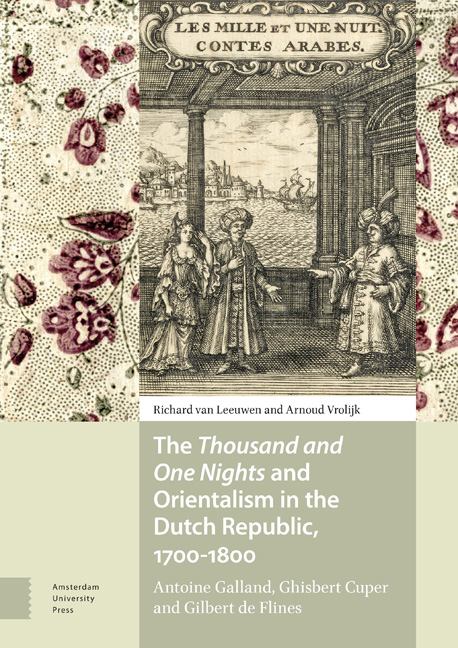 Thousand and One Nights and Orientalism in the Dutch Republic, 1700–1800
Thousand and One Nights and Orientalism in the Dutch Republic, 1700–1800 Book contents
- Frontmatter
- Contents
- Introduction
- 1 The Thousand and one nights and literary Orientalism in Europe
- 2 Dutch Orientalism before 1700
- 3 Antoine Galland and Ghisbert Cuper
- 4 The early editions of the Nights
- 5 Gilbert de Flines
- 6 Later editions in the eighteenth century
- 7 Dutch Orientalism in the eighteenth century
- Conclusion
- Appendix 1 Bibliographic survey of Dutch editions, 1705-1807
- Appendix 2 The David Coster engravings
- Appendix 3 Text samples of the Dutch Nights
- Appendix 4 French and Dutch quotations
- Illustration credits
- Bibliography
- Index
Conclusion
Published online by Cambridge University Press: 21 November 2020
- Frontmatter
- Contents
- Introduction
- 1 The Thousand and one nights and literary Orientalism in Europe
- 2 Dutch Orientalism before 1700
- 3 Antoine Galland and Ghisbert Cuper
- 4 The early editions of the Nights
- 5 Gilbert de Flines
- 6 Later editions in the eighteenth century
- 7 Dutch Orientalism in the eighteenth century
- Conclusion
- Appendix 1 Bibliographic survey of Dutch editions, 1705-1807
- Appendix 2 The David Coster engravings
- Appendix 3 Text samples of the Dutch Nights
- Appendix 4 French and Dutch quotations
- Illustration credits
- Bibliography
- Index
Summary
In the previous chapters we have presented a concise and certainly not exhaustive overview of the way in which the Thousand and one nights was received in the Netherlands and how this was related to Dutch scholarly and literary interest in the Near East. In conclusion, we can say that Dutch Orientalism in the eighteenth century reflected the circumstances of that period. Clearly, the legacy of the seventeenth century, the Dutch ‘Golden Age’, continued to reverberate in intellectual life. The economic prosperity, intellectual fervour and interest in exotic worlds that marked the seventeenth century most certainly did not wane in the subsequent period. At least until 1750, the Dutch Republic remained one of the centres of European print culture and a refuge for literati fleeing censorship and repression elsewhere. Oriental studies continued to flourish, with important travelogues, scholarly reference works and scholarly, literary and philosophical texts being printed in Amsterdam, The Hague and Leiden. The various French-language pirated editions of the Mille et une nuit by the Hussons and Wetsteins are a prime example of this phenomenon.
Still, while the term stagnancy may be unjustified, it is clear that Dutch society in the eighteenth century experienced a certain backlash and a re-orientation of economic and cultural ambitions. The period of economic expansion and exploration of the outside world had come to an end and was followed by a phase of re-establishing the identity of the Dutch Republic in the political and cultural sense. As before, Dutch society and culture were intertwined with neighbouring countries, whose influence could be felt in the fields of literature and thought, but this connectedness increasingly came to be seen as a threat to the survival of the Dutch nation. The widespread use of French – at first perceived as a sign of cultural participation on an international level – came to be regarded towards the very end of the century as an expression of cultural subservience to a foreign power. Efforts were undertaken to found Dutch literary societies and journals, but these were either short-lived or lay dormant for decades on end. Neither were there any towering figures in culture and politics who could inspire a new self-confidence and who could become the leading force in a re-orientation of the nation.
- Type
- Chapter
- Information
- Thousand and One Nights and Orientalism in the Dutch Republic, 1700–1800Antoine Galland, Ghisbert Cuper and Gilbert de Flines, pp. 133 - 136Publisher: Amsterdam University PressPrint publication year: 2019


